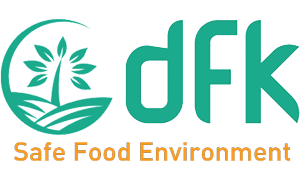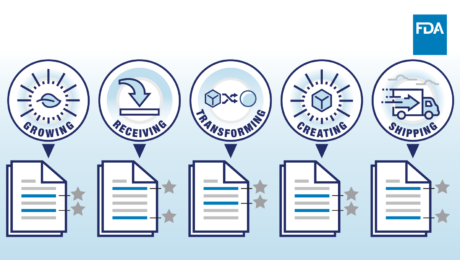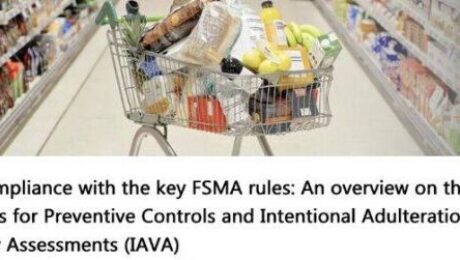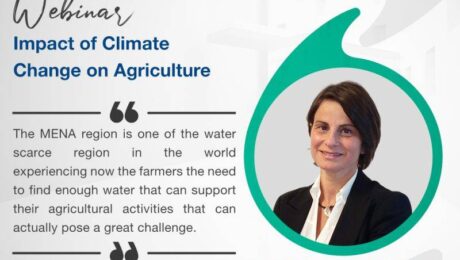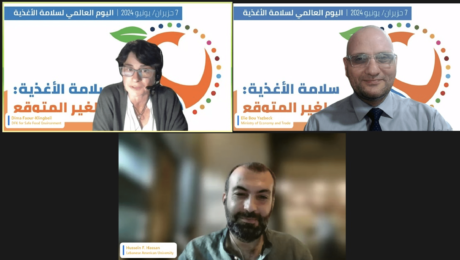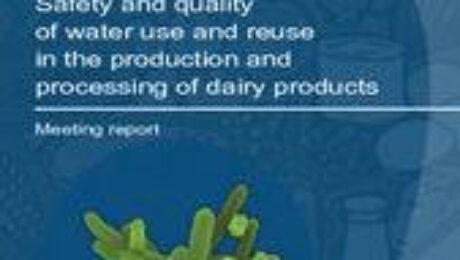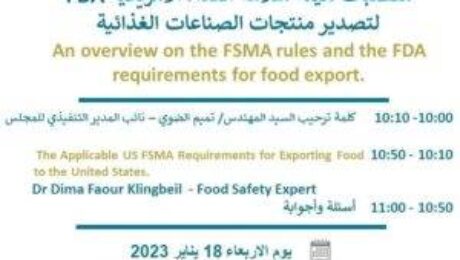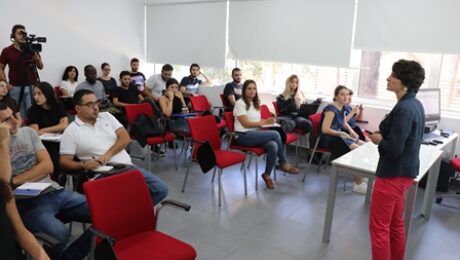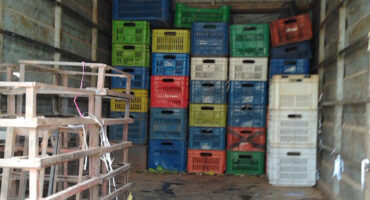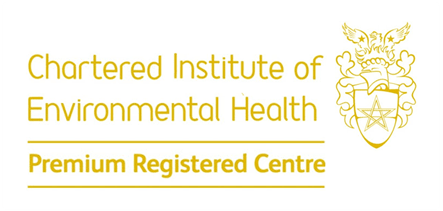Food labels review for entry to the US, EU and UK markets.
Ensuring compliance with the key FSMA rules: Understanding the Food Traceability Final Rule and its requirements.
Friday, 07 February 2025
by Dr Faour Klingbeil
With the FDA Food Traceability Rule compliance deadline of January 20, 2026, fast approaching, Dr Faour-Klingbeil presented the second topic in the FSMA series in coordination with SGS Germany GmbH, and this time, it’s all about the FDA Final Rule on Requirements for Additional Traceability Records for Certain Foods (Food Traceability Final Rule). Webinar Agenda 1.SGS Introduction 2.Presentation– What is the FSMA Food Traceability Final Rule?– Key Requirements of the FSMA Traceability Rule– Covered Entities: Who is required to comply?– Food Traceability ListCritical Tracking Events (CTEs)– Key Data Elements (KDEs)– Traceability Plan– Traceability Records Requirements3.Q&A Session You can access the FREE Webinar recording by filling out the registration form in this link HERE
Ensuring Compliance With The Key FSMA Rules
Friday, 06 December 2024
by Dr Faour Klingbeil
The U.S. Food Safety Modernization Act (FSMA) has transformed food safety regulations in the US, with a strong emphasis on shifting regulatory focus from reactive to proactive. For food exporters, compliance with FSMA is now crucial to access or maintain their position in the U.S. market. From supply chain controls to traceability, foreign food suppliers must ensure their safety systems meet FDA standards, or risk barriers to entry or rejection of shipments. Dr Faour-Klingbeil joined SGS Germany GmbH for this webinar. She presented a brief introduction to FSMA and its relevance to businesses exporting food products to the U.S. market, and will focus on two critical compliance areas, the Preventive Controls Human Food rule and the Mitigation Strategies to Protect Food Against Intentional Adulteration rule. Webinar Agenda 1. Short presentation of the SGS/SGS Academy 2. Presentation What is FSMA?Background and Purpose of FSMAThe FSMA RulesImportance of preventive measures and proactive food safety FSMA Preventive Controls RuleKey Provisions of the Preventive Controls (PC) RuleCompliance RequirementsCommon Compliance Challenges and Solutions FSMA Intentional Adulteration Rule Purpose and Scope of the IA RuleKey Requirements of the IA RulePractical Steps to Implement the IA Rule 3. Q&A Session You can access the FREE Webinar recording by filling out the registration form in this link HERE
PCQI Version 2.0 starting 2025!
Thursday, 07 November 2024
by Dr Faour Klingbeil
DFK for Safe Food Environment is constantly committed to staying at the forefront of food safety education to ensure our clients and delegates have access to the most up-to-date and relevant information. We are thrilled to announce that we have successfully completed the the lead instructor refresher for the new FSPCA Preventive Controls for Human Food v.2 course, reinforcing my dedication to providing top-quality training aligned with the latest standards and best practices. But that’s not all! As part of my ongoing efforts to enhance the knowledge and expertise of food safety professionals, we are excited to share that in 2025, I will be rolling out the updated PCQI (Preventive Controls Qualified Individual) curriculum. This curriculum, designed by the Food Safety Preventive Controls Alliance (FSPCA), reflects the newest updates in food safety regulations, ensuring that delegates are prepared to meet the evolving needs of the industry. As food safety standards continue to evolve, the new curriculum will integrate the most recent updates from the FDA and FSMA (Food Safety Modernization Act), providing delegates with an in-depth understanding of how these changes impact food safety practices and compliance. What’s New with the PCQI Updated Curriculum? The upcoming PCQI curriculum is designed to address the latest challenges and developments in the food industry. Here’s a sneak peek at what the new version will bring to our delegates: Stay tuned for more information on the PCQI 2025 curriculum. Meanwhie, I continue to offer the standard official FSPCA PCQI program on demand, in-house, or in presence. The scheduled courses for 2025 – which will likely be the new version- are found in our training calendar, click on this LINK. For more details or help to register for upcoming courses, don’t hesitate to reach out!
Impact of Climate Change on Agriculture
Saturday, 02 November 2024
by Dr Faour Klingbeil
Dr. Faour-Klingbeil was invited to speak at a webinar organized by the Islamic Chamber Training Academy of the Organization of Islamic Cooperation. The event focused on the impact of climate change on agriculture, the repercussions of global warming on food security, and the most prominent solutions to mitigate natural disasters. In her presentation, Dr. Faour-Klingbeil highlighted the effects of climate change on water pollution and its implications for the safety of fresh produce, emphasizing the need for sustainable approaches to protect both the environment and food systems.
World Food Safety Day 2024
Friday, 07 June 2024
by Dr Faour Klingbeil
Prepare for the unexpected Happy World Food Safety Day.. In celebration of World Food Safety Day, themed “Food Safety: Prepare for the Unexpected,” and in our effort to engage consumers, Dr Faour-Klingbeil was joined be joined by Dr. Hussein Hassan, Associate Professor of Food Science and Technology and Director of Academic Compliance at the Lebanese American University, and Mr. Elie Bou Yazbeck, Food Science Expert in the Consumer Protection Directorate at the Ministry of Economy and Trade. A heartfelt thanks to the panelists for their presence and the valuable information they shared on consumers’ roles and awareness in food safety, with a particular focus on Lebanon. We discussed how consumers can effectively contribute to food safety, which plays a crucial role in preventing foodborne diseases and minimizing potential risks, and the current endeavors and coordinated activities between the educational institution and public sector. I hope this video will reach many individuals who are not yet aware of how to report their observations and connect with the official authorities. Consumers are urged to be proactive in reporting any issues related to unsafe practices or conditions that may put food at risk of contamination. For more detailed information, please refer to the video at the minute 50:15. اليوم العالمي لسلامة الأغذية: الاستعداد لما هو غير متوقع Posted by DFK for Safe Food Environment on Friday 7 June 2024
Safety and quality of water use and reuse in the production and processing of dairy products
Wednesday, 07 June 2023
by Dr Faour Klingbeil
In 2020, the 43rd session of the Codex Alimentarius Commission approved the new work entitled “Development of Guidelines for the Safe Use and Reuse of Water in Food Production” proposed by the 51st session of the Codex Committee on Food Hygiene. To support this work, the Joint FAO/WHO Expert Meeting on Microbiological Risk Assessment (JEMRA) was asked to provide scientific advice regarding safe use and reuse of water in the dairy sector. Dr. Dima participated in the JEMRA experts panel tasked to provide clear and practical guidance on risk-based approaches to assess and manage fit-for-purpose water sourcing, use and reuse in the dairy sector. The collective efforts led to publication of a report that describes the application of the concept of fit-for-purpose water for use in the production and processing of dairy products. Report available in this link: FAO & WHO. 2023. Safety and quality of water use and reuse in the production and processing of dairyproducts – Meeting report. Microbiological Risk Assessment Series, No. 40. Rome, FAO.https://doi.org/10.4060/cc4081en
PCQI WORKSHOP – USAID Trade Reform & Development in Egypt (TRADE) 2023
Friday, 24 March 2023
by Dr Faour Klingbeil
For the second year, and as part of the integrated capacity enhancement initiative of the USAID TRADE project to strengthen the Egyptian Food Export Council (FEC) and their members’ capacity to access the US market, Dr Faour-Klingbeil delivered the official course “Preventive Controls Qualified Individual (PCQI)” for 12 SMEs at the FEC premises from 07.- 09.03.2023. The course aimed to support Egyptian SMEs in the food sector better understand how to develop a Food Safety Plan and meet the FDA food safety requirements to improve regulatory compliance and enhance food exports.
FEC Webinar on the FSMA rules and the FDA requirements for food export – Egypt
Wednesday, 25 January 2023
by Dr Faour Klingbeil
Dr Faour-Klingbeil offered a presentation on the FSMA rules and the FDA Requirements for Food Export during a webinar organized by the Food Export Council in Egypt on 18.01.2023 and attended by more than 95 participants. What are the FSMA rules? how does FSMA affects foreign facilities? what are the steps to meet the FDA requirements for food export? What is the responsibility of the PCQI? Watch here:
Fit for US business: Success is in the details- FDA requirements for food export
Monday, 27 June 2022
by Dr Faour Klingbeil
On June 8th and 9th, 2022, the USA was the focus of the international IHK (Chamber of Industry and Commerce of East Westphalia in Bielefeld) meeting days in terms of the economic, entrepreneurial and political aspects – “East Westphalia meets USA”. Dr. Faour-Klingbeil was invited to the session “Fit for US business: Success is in the details” to speak about the Food Safety Modernisation Act rules, the FDA requirements and registration for food export. She offered as well an overview of the preventive controls rule for human food, the role of the PCQI and how the FSVP obligations affect foreign facilities or food exporters.
FAFS Lecture Series | An overview of the FSMA and its implications for food exporters
Wednesday, 16 December 2020
by Dr Faour Klingbeil
As part of the American University of Beirut FAFS (The Faculty of Agricultural and Food Sciences ) Lecture Series, Dr. Dima was invited to deliver an open lecture on “An overview of the Food and Drug Administration Food Safety Modernization Act (FSMA) and its implications for food exporters” that took place on the 10th of October 2019. About the lecture: Foodborne disease is a significant burden worldwide. In the United States, it is estimated that 48 million people get sick, 128 000 are hospitalized, and 3000 die annually from contaminated food or beverages. Prompted by the increasing prevalence of imports, high-profile food outbreaks, food fraud, and emerging hazards, the U.S. Food Safety Modernization Act was signed into law in 2011, the first historical reform to the legislative landscape of the food and beverage industry in over 70 years. FSMA has made fundamental changes to U.S. food laws. It shifted the focus of food safety from reactive to preventive approach and gave the U.S. Food and Drug Administration explicit authority and broader prevention mandate to protect consumers’ health. Instead of relying only on port-of-entry inspection, FSMA emphasizes key regulations that span across the food supply chain. Among other modifications, it imposes new responsibilities on food importers to verify that their foreign suppliers of food for human and animal consumption meet applicable FDA safety standards to ensure the safety of food imported into the U.S.
- 1
- 2
